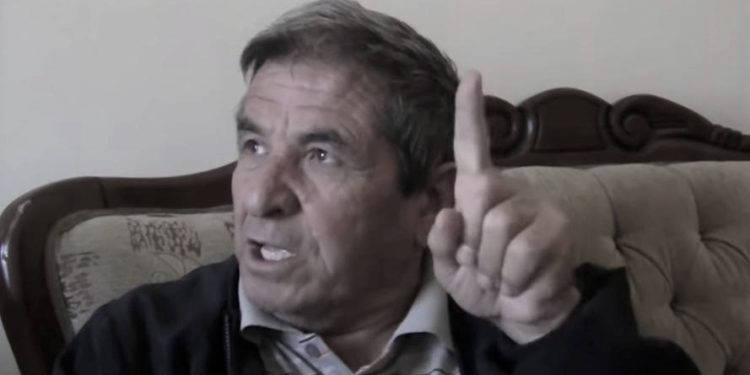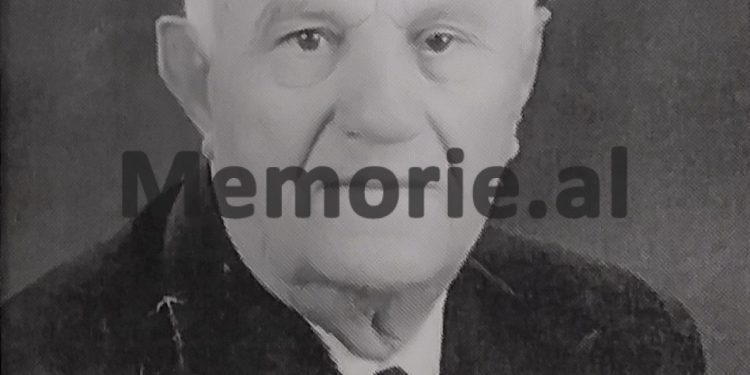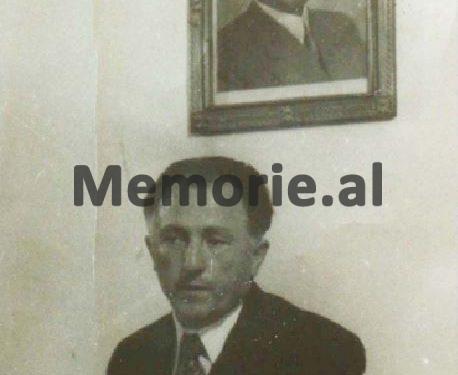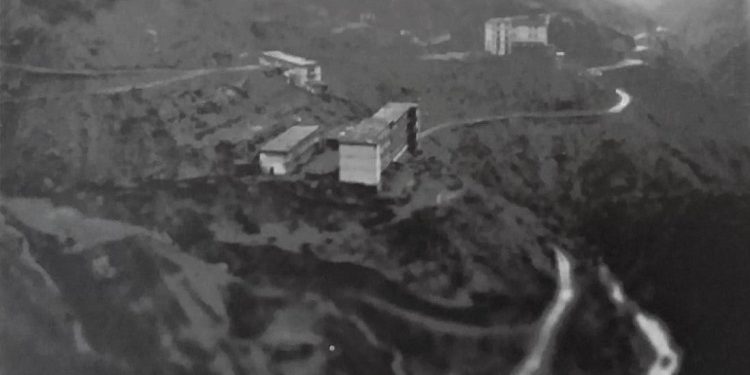Second part
Memorie.al / While he was serving his second sentence, Spiro Nasho moved to Spaçi camp, where in 1973, the prisoners’ revolt broke out. The convicts took possession of the camp for three days throwing anti-communist slogans, demanding their rights and standing in front of the armed forces of the Albanian army and police until the morning of May 23, they were defeated. Skender Daja, Pal Zefi, Dervish Bejko and Hajri Pashaj were sentenced to be shot; the organizers, but also some who were simply picketed: Dashnor Kazazi, Luan Burimi, Syrja Lame, Sami Dangëllia, Lush (Paulin) Vata, Jorgo Papa, Hodo Sokoli and Luan Koka, with 25 years in prison and dozens of others were tried in groups, continuing, receiving various punishments. Among them was Spiro Nasho, who was sentenced for the third time. 47 years since the Spaç revolt, brings the account of the participant of that revolt, who remembers the three days when the most persecuted and mistreated layer of the Albanian society nailed the dictatorship with its calls for freedom and raised the Albanian flag without the communist symbol over Spaç
Mr. Spiro, before you were sent to Spaçi prison, where did you serve your sentence?
We were in Zvrnec and after the work was finished in Narta in Vlora, at the salt pan, the embankment was built and from Vlora we were taken to Spač. That famous great, Mehmet Shehu that his sons also ended up there. Not with me, but that’s where they ended up, in that prison that their father made. They also took us to Spač, to the mine, extraordinary conditions, heavy, very difficult life, in some bad silos, a terrible life, yes with suffering, cursing yourself: why were you born!
What exactly did you do in Spaç?
Laborer, with a shovel. In the mine, worker, miner.
How was the treatment by the staff?
Even when someone died, because my friends were also killed in my hands…!
Have your friends been killed?
Yes, yes, Sabri Keçi, from Kruja.
How did he die?
The block fell on him, the mountain fell on him, it opened his head, it opened his skull, even the policemen said: “One less enemy”. In other words, they wanted our death. He worked for them and again: “One less enemy”!
Was this their behavior?
This was their behavior and they said: “We have nothing to do with the law, because we shoot all of you, we don’t leave anyone alive”, the officers and policemen said: “We have nothing to do with the law, because for the sake of our souls, we kill you all”.
Do you remember the names of those who behaved worse?
Yes…! The operator of the camp was one Fejzi Liço, from Tërbaçi i Vlora, a dog son of a dog, there was no earth more despicable man, and there was also Preng Rrapi, Pjetër Koka, policeman in Spaç, Pjetër Gjini. I forgot many names, because I spent 17 years in Spaç. Full 17 years, in the mine.
How did the Spaci revolt begin?
It started for no reason. It was a boy, Pal Zefi. He was also shot. He ran away from the dungeons, because his time was up. “No, the 30-day period in the dungeon is not over,” the policemen told him. For one day, he leaves the deadline; he comes to our camp there. Yes, this revolt was boiling; dissatisfaction was in our soul, in us. It was not only the cause of this. This Paul comes there and says: “Save me, don’t leave me in their hands”.
The prisoners are reluctant, because they were afraid; they had the law, the power. It was an extraordinary dictatorship. A boy, a Syrja Lame from the Colony of Korça, said: You are men, what the hell are you?! “O men, today or never again”! When he said these words, the prisoners jumped on him, rescued him and started beating the policemen. They beat the policemen, but one boy, one Jorgo Papa, a minority, grabbed eight policemen and laid them on the ground as if they were rags, not people. Such a powerful boy. He lives now, he is an immigrant in Greece, you know, but very brave.
He also contributed with us. The revolt began. We took the policemen out of the camp. The police tried to enter the second time, by force, inside. They stand in an open row with the prisoners. They went out. A state of emergency is declared. The camp is liberated, no one enters. It was the second night. Abaz Ermenji’s nephew, Tomorr Allajbeu, (sister’s son) had a red sheet. We say: Give it to us, you Tomorr, because we want to make the Albanian flag. “Yes, we, order”, Tomorri told us.
Let’s go to Mersin Vlashi, who was a designer, from Mati, a prisoner and he had done… he collapsed in prison. I was told he is dead. We said: Make us the vulture. Mersin Vlashi said this: “It is the greatest honor that has ever been given to me; I have never been given a greater honor than what you are telling me, that I am doing for you”.
Mersini did it with pleasure. We raised the flag, the second night of the revolt. We raised the flag. I want to qualify: Albanian nationalists participated in the raising of the flag, the real ones, and the ones we say, either from Mirdita or from the South, the nationalists, the ballisticians.
Do you remember the names of those who participated in the flag rising?
Yes! Tomorr Allajbeu, Gjete Kadeli, Neim Pashaj, Ndrec Çoku… there are others.
What happened after the flag was raised?
The flag was raised. On the third floor, the vulture flag without a star was raised, because even the gangs on the mountain could not raise the flag, we raised it there. We raised the flag. An old man, Riza Dyli, with all his brothers, from Berat, also a nationalist, had been with the battalions of the National Front, said: That flag sits only with blood.
“Look, – I told him – uncle Riza: the flag is lowered with blood, it should not be lowered without blood, but you will be the first to set an example, because you participated in the nationalist parties, against the communists. You will set an example, we will follow from behind”. The old man followed us behind, even in court with us, this old man, I don’t know if he’s alive or not, I don’t believe it.
Riza Dyli, good family, both brothers, good nationalists, from Berat. The second day of the revolt passes. That this was the first day May 21, 1973. The second day of the revolt: when he saw this extraordinary situation, Sule Manoku, the head of the Internal Branch of Mirdita, informed the government that an alarming situation has become here. The commissar wanted to put him down, a Shahin Skura, but such a great revolt could not be contained.
Notifies the government. When we look at the second day, the police come. The policemen of Kasem Kaçi. Kasëm Kaçi was the General Director of the Police of the Republic. The police, not the army. “Look,” he said, “listen to the government’s decision: if tomorrow, by 9:00 a.m., you do not surrender, we will use all the means available to the dictatorship of the proletariat, we will crush you with fire and iron”! Come here, we are waiting for you, we are ready! – said Mersin Vlashi to the prisoners, Even one Pjetër Gjoka, from Dukagjini, used to dance, he said: “There is nothing I love braver, without a rifle, than you”, said this Pjetri.
How was the revolt suppressed?
On the third day, 24 cars arrived with soldiers, 4 with ammunition and a kitchen, sent by the commander of the Laprak Company, of the Pursuit Departments, who was Bako Dervishi, former major general. They also brought a tank; they also used gas bombs to put us to sleep, so that if we didn’t surrender, they would put us to sleep. Those boys told me: “Come on, let’s resist the last night, andlet’s not give up.”
I told them: Guys, Spiro doesn’t forget. I have no one at home, I am a single boy, and I am with you! I don’t forget you. They stayed there all night. In the morning, they resisted. They resisted, but there were 4 of them. They resisted with an entire army. 600 men rushed upon them. When a boy, Dervish Bejko from Pogradeci, a major, the most terrible of Tirana, jumped to grab him by the hand.
Dervish Bejko falls with a crowbar on his head, laying him on the ground. A spear is thrown to catch the Dervish again, it falls on the other one as well: almost dead on the spot as well. A couple of others are thrown, injuring a couple of other prisoners. This Kasëm Kaçi, director of the Republic Police, says to the camp commander: “How many wounded do we have so far?”
– “Four people”, says this camp commander. He says: “Open fire! Open fire”, he says.
“No, no,” said Kasëm Kaçi, “don’t kill, because they will appear in court.” Don’t kill anyone. They will appear in court, all of them”. There the fight continued bap and bap, wood creaking bam and bam and bam and bam. Finally they were crushed; they had nothing more to do. They crushed them, took them out half dead. They put them on the stretcher two by two and throw them in the stack there.
The Military Collegium of the Supreme Court is coming to Spaç. The court session continues. That there was a trial in the camp in Spaç: a court session in a state of emergency. There were 11 people. Four people are sentenced to death: Hajri Pashaj, whose mother did not make him braver, Dervish Bejko, Skënder Daja and Pal Zefi, who became the whole cause.
We made up for Paul, for Paul Zefi, for no one else.
I want to say, that boy, that Hajriu, there is no braver boy than the land of Albania, I tell you honestly, there is no way a braver boy is born. He said to Feçor Shehu: “You don’t know me, he said, I am the son of Zenel Brahushi”.
“I don’t know you,” Feçor Shehu said that he was from a village with Feçor. – I knew your father, he said. Your father shot 12 council members. It burned 500 houses.” “My father didn’t kill,” said Skenderi, “but you got a hound,” he said to Feçor, “you and your friends took my father’s hat off.”
“Let me fix it.” “I want more…”! That we are talking like this…! “What do you have to say at the end?” He said to him: “You are political adventurers, it was broken with the Yugoslavs, it was broken with the Russians, with the Chinese and so on…. You,” he said, “you will come here where I am.” He shot Hajriu, but boy braver…That even a Bedri Çoku, a boy and he was very brave, that there was no more, even a Paulin Vata.
Paulini, very smart, very capable, but careerist. What had Paulini done? Paulini had spent 15 years in prison in Yugoslavia, sentenced there. There, in prison in Yugoslavia, he finds the address of Leka Zog, the King. He also says that my family and I are dedicated birders. He has sent his salary as a reserve officer for 14 years in a row, but Paulini was an officer in Albania, in the Shkodra branch, but a very strong boy, also a careerist.
How many times have you been convicted?
Three times.
When was the third time?
The third time was after May 21, 1973. I was sentenced for 24 years, the last time.
Where did you spend the last prison?
Yes, in Spaç, a bit in Burrel, then I was in Qafë-Bari.
Episode of violence from your guardians, do you remember?
For those of us who came from the investigation in Tirana, in Mirdita, there they also used the means of poisoning, to poison the prisoners, for example we had a boy from Teshtaniku, he is now dead, a Gëzim Medolli, and he said to them: “I all I will cut your bullets here with my chest”, he said. The lonely, brave boy, Gëzim Medolli from Teshtaniku, very brave, has died. “I cut the bullets in the chest here”, he said.
What methods did the investigator use against you?
The investigation ooo! I did the investigation here at the New Prison, in the investigation room; I did the investigation from the Second Directorate of Discovery. This is in ’76, not ’73. In ’76 I became the investigator here, the special investigator. You looked at them: “good people”, wearing collars, but they used wood like beasts. Those investigators that I had, had been investigators with the “bandit” of the North. They had mobilized the elders for me.
Remember the names of the investigators, who were they?
Posi, but they have killed them all. After the fall of Mehmet Shehu, they all disappeared. Director of State Security, Muço Saliu; Andon Butka, investigator; Skender Sadiku, investigator. I was dealing with these two. Even more so, the director of the State Security, it was a case, comes in. He was a short man, with 5-6 people behind him. He comes to the gate. He speaks, I speak, he speaks, I speak.
I didn’t know who it was. “Boy”, he told me. “Order sir”, (because “sir” we used to say to the policemen that they didn’t want “friend”), “I am not your friend”, sir. This interrogator who was beating me with a stick put my hand here in his mouth. “I am the one who waits for the tickets to the next world.” This was Muço Saliu, the director of State Security. Even Nevzat Haznedari came as a listener, not as an investigator.
Meanwhile, what happened to your family when you were in prison?
We had the house. We had two floors, we also had a garden. I went to jail, they confiscated it. They finally destroyed it, from the foundations, they left nothing, but the confiscation was Lenin’s law, the one they said: “The convicted person should not only feel the criminal punishment, but also feel it economically”.
They also took the table spoons from us. What more can you do to a man? You can take everything, but also the tablespoons, there is nothing more humiliating. I find this spoon very heavy, the one you put in your mouth.
How did the parents treat them?
They removed them, left them in a hut there, which occupied them above.
Did your relatives come to see you?
Only father and mother, no one else. Father and mother, sisters were small. They traveled all over Albania with their backs.
How did they travel and how were they treated when they came to see you?
Yes, there was a 7-minute meeting that they did, by the clock. When it was 7 minutes, “come on get up”, he said.
Were they able to come and go within the day?
No, no, they couldn’t.
Where did they sleep?
Sometimes they slept outside. My father had been sent a raincoat from Australia, my uncle wore raincoats, and they slept outside. That there was none, until the morning came. It was late afternoon. Transport was very difficult then.
Your co-sufferers have shown that the drivers refused to take them because they were family members of the convicts
It’s very true. Yes, I have heard other things, that the women and those soldiers came, arrested them, and dishonored them. You know these too! That I am indignant, but I have nothing to do. They have humiliated us so much, that there are no more!
What years were you released?
I was released in December 1990.
How did you expect the democratic movements?
The opinion of the convicts there was that that kind of dictatorship, so savage and so harsh, could not be overthrown from within; only an external power could help us, and the turning point of all things, was the revolution in Romania, the overthrow of Ceausescu. Then we said: “We will eat you alive; we will eat you with rags”.
How did the police react?
Staggered, they began to sway. The policemen told us: “We don’t follow the orders, because if we did what the officers tell us, we would eat you all alive, but we make it a little more tolerable. Cops, not officers.”
We even had a camp commander, one Edmond Caja, who he claimed to become a minister; he should be punished for being a war criminal, for bloodshed. One of the meanest, there was no way to do it. Sandër Sokol, in the Qafë-Bari Revolt, was strangled to death by a camp officer, a Lekë Ymeri from Tropoja.
Do you owe anything to those who have wronged you?
I am very sorry that people of the same blood behave with the barbarism they have treated us, it is completely unforgivable. Again, nationalists are always generous, forgiving. Despite all the indignities they have done to us, we still forgive them. We are not bloodthirsty, criminals like them. We are humane people. Memorie.al














